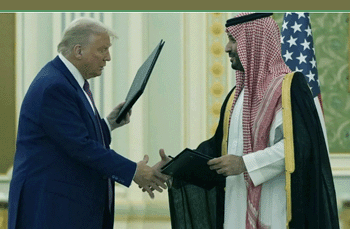05-14-2025 Chris Mitchell
JERUSALEM, Israel – President Donald Trump ended the first day of his first Middle East trip in the second term with a series of stunning economic and political initiatives. The moves will likely have a major impact on the region, the U.S., and Israel.
The president signed a deal on Tuesday with Saudi Arabia worth hundreds of billions of dollars. He also encouraged Saudi Prince Mohammed bin Salman to recognize Israel, claimed he’s lifting sanctions on Syria, and issued a new warning to Iran.
The deal with Saudi Arabia amounts to about $600 billion — including a $142 billion arms agreement — with potentially more investments up to a trillion dollars.
At the Saudi Investor Conference, Trump urged the Saudis to join the Abraham Accords, stating, It’s my fervent hope, wish, and even my dream that Saudi Arabia, a place I have such respect for, especially over the last fairly short period of time, what you’ve been able to do, but will soon be joining the Abraham Accords.”
He added, “It will be a special day in the Middle East with the whole world watching, when Saudi Arabia joins us, and you’ll be greatly honoring me and you will be greatly honoring all of those people that have fought so hard for the Middle East, and I really think it’s going to be something special. You’ll do it in your own time.”
The president also criticized the regime in Tehran and blamed it for much of the turmoil in the Middle East.
“The biggest and most destructive of these forces is the regime in Iran, which has caused unthinkable suffering in Syria, Lebanon, Gaza, Iraq, Yemen, and beyond,” Trump declared.
And he issued an ultimatum.
“I want to make a deal with Iran,” he said. “If I can make a deal with Iran, I’ll be very happy if we’re going to make your region and the world a safer place. But if Iran’s leadership rejects this olive branch and continues to attack their neighbors, then we will have no choice but to inflict massive maximum pressure, drive Iranian oil exports to zero, like I did before… and take all action required to stop the regime from ever having a nuclear weapon. Iran will never have a nuclear weapon.”
Trump also announced the U.S. has taken steps to normalize relations with Syria and will lift sanctions at the urging of Crown Prince bin Salman and Turkish President Recep Tayyip Erdogan.
The president revealed “(Erdogan) called me the other day and asked for a very similar thing, among others, and friends of mine, people that I have a lot of respect for in the Middle East. I will be ordering the cessation of sanctions against Syria in order to give them a chance at greatness.”
Trump met on Wednesday with the new self-appointed president of Syria, Ahmad al-Sharaa.
Dr. Kamal Sido, a human rights activist, just visited Syria and questions whether al-Sharaa, who at one time was a member of the terror group ISIS, has changed.
Sido says al-Sharaa, who led an ISIS faction under the name Abu Mohammad al-Julani, is still the same person. He insists, (al-Shara) may be moderate, but (in practice), in fact, he is a radical Sunni imam.”
Sido believes minorities in Syria are fearful of the new government.
“I met some (in the) Catholic, Latin Christian community. All this group said, ‘Kamal, if you go to Germany, if you go to other countries, please (tell) them – we need protection. All these countries supported radical Islam, radical Sunni groups in Syria. We are in fear. They have to help us, to protect us from radical Islam.”
In Gaza on Tuesday, the Israel Defense Forces bombed a tunnel system where they believed Hamas’s top leader, Muhammad Sinwar, was hiding. Israel saw Sinwar as a major obstacle to a hostage deal.
